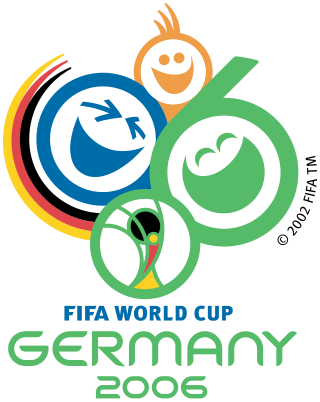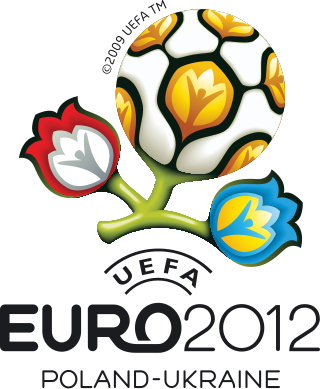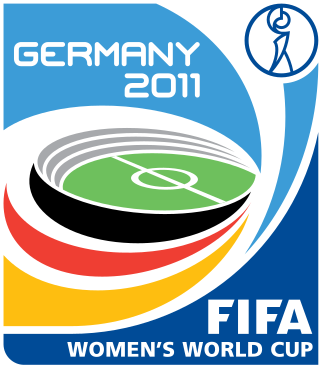Related Research Articles
Budweiser is an American-style pale lager, a brand of Belgian company AB InBev. Introduced in 1876 by Carl Conrad & Co. of St. Louis, Missouri, Budweiser has become a large selling beer company in the United States. Budweiser is a filtered beer, available on draft and in bottles and cans, made with up to 30% rice in addition to hops and barley malt.

The 2002 FIFA World Cup, also branded as Korea/Japan 2002, was the 17th FIFA World Cup, the quadrennial football world championship for men's national teams organized by FIFA. It was held from 31 May to 30 June 2002 at sites in South Korea and Japan, with its final match hosted by Japan at International Stadium in Yokohama. During the opening ceremony, the championship was declared opened by President of South Korea Kim Dae-jung.

The 2006 FIFA World Cup was the 18th FIFA World Cup, the quadrennial international football world championship tournament. It was held from 9 June to 9 July 2006 in Germany, which had won the right to host the event in July 2000. Teams representing 198 national football associations from all six populated continents participated in the qualification process which began in September 2003. Thirty-one teams qualified from this process along with hosts Germany for the finals tournament. It was the second time that Germany staged the competition and the first as a unified country along with the former East Germany with Leipzig as a host city, and the 10th time that the tournament was held in Europe.

The 2010 FIFA World Cup was the 19th FIFA World Cup, the world championship for men's national football teams. It took place in South Africa from 11 June to 11 July 2010. The bidding process for hosting the tournament finals was open only to African nations. In 2004, the international football federation, FIFA, selected South Africa over Egypt and Morocco to become the first African nation to host the finals.

The UEFA Super Cup is an annual super cup football match organised by UEFA and contested by the winners of the two main European club competitions: the UEFA Champions League and UEFA Europa League. The competition's official name was originally the Super Competition, and later the European Super Cup. It was renamed the UEFA Super Cup in 1995, following a policy of rebranding by UEFA.

Arena AufSchalke, currently known as Veltins-Arena for sponsorship reasons, is a retractable roof and pitch, football stadium in Gelsenkirchen, North Rhine-Westphalia, Germany. It opened on 13 August 2001, as the new home ground for FC Schalke 04. The stadium has a capacity of 62,271 for league matches and 54,740 for international matches. It hosted four matches at UEFA Euro 2024. The naming rights to the stadium were sold in July 2005 to the German brewery Veltins.

Sponsoring something is the act of supporting an event, activity, person, or organization financially or through the provision of products or services. The individual or group that provides the support, similar to a benefactor, is known as the sponsor.

Naming rights are a financial transaction and form of advertising or memorialization whereby a corporation, person, or other entity purchases the right to name a facility, object, location, program, or event, typically for a defined period of time. For properties such as multi-purpose arenas, performing arts venues, or sports fields, the term ranges from three to 20 years. Longer terms are more common for higher profile venues such as professional sports facilities.

Harbour View Football Club is a Jamaican football club based in Kingston that currently plays in the top flight Jamaica Premier League.

The IsraelFootball Association is the governing body of football in Israel. It organizes a variety of association football leagues where the highest level is the Israeli Premier League; as well as national cups such as the Israel State Cup, the Toto Cup, and the Israel Super Cup; also, the Israel national football team. The IFA was founded in 1948 as the Palestine Football Association and is based in the Tel Aviv District city of Ramat Gan, Israel. The Association is controversial due to its inclusion of clubs playing in Israeli settlements in the occupied West Bank.

The 2012 UEFA European Football Championship, commonly referred to as UEFA Euro 2012 or simply Euro 2012, was the 14th European Championship for men's national football teams organised by UEFA. The final tournament, held between 8 June and 1 July 2012, was co-hosted by Poland and Ukraine, and was won by Spain, who beat Italy in the final at the Olympic Stadium, Kyiv, Ukraine.

Max-Morlock-Stadion is a stadium in Nuremberg, Germany, which was opened in 1928. It is located next to Zeppelinfeld. It also neighbors the Nuremberg Arena.

The 2011 FIFA Women's World Cup was the sixth FIFA Women's World Cup competition, the world championship for women's national football teams. It was held from 26 June to 17 July 2011 in Germany, which won the right to host the event in October 2007. Japan won the final against the United States on a penalty shoot-out following a 2–2 draw after extra time and became the first Asian team to win a senior FIFA World Cup.
Corporate sponsorship of major English football competitions dates back to the early 1980s, although minor competitions such as the Watney Cup and Texaco Cup were sponsored during the early 1970s.

The Adidas +Teamgeist is a football made by Adidas and developed jointly with Molten Corporation. It was the official match ball for the 2006 FIFA World Cup in Germany. The plus sign in its name was introduced for trademark purposes, since the regular German word Teamgeist, meaning "team spirit", could not be trademarked.
Leeuwenhosen are orange-colored, lion-tailed overalls distributed by the Bavaria Brewery, a popular Dutch beer brewery, during the 2006 FIFA World Cup. The concept was realized by Peer Swinkels, the chairman of Bavaria. The leeuwenhosen refers to the lion as the Dutch national symbol, as is the 2006 FIFA World Cup mascot Goleo VI. The word "leeuwenhosen" is a mix of the Dutch word for "lions" and the German word for "trousers", in the same style as the German article of clothing called lederhosen.

The 2017 FIFA Confederations Cup was the tenth and final edition of the FIFA Confederations Cup, a quadrennial international men's football tournament organised by FIFA. It was held in Russia, from 17 June to 2 July 2017, as a prelude to the 2018 FIFA World Cup.
The FIFA Fan Festivals are public viewing events organized by FIFA and the host cities during the FIFA World Cup. FIFA Fan Festivals followed the success of public viewing at the 2002 FIFA World Cup in South Korea and became an essential part of the tournament since the 2006 FIFA World Cup in Germany. Fan Festivals take place in iconic locations of the host cities and feature broadcasts of football matches on giant screens, live concerts, parties, food, beverages, and other activities and entertainment. In 2022, FIFA reintroduced Fan Festivals under the new name for the 2022 FIFA World Cup held in Qatar.

Westfalenstadion is a football stadium in Dortmund, North Rhine-Westphalia, Germany, which is the home stadium of Borussia Dortmund. Officially called Signal Iduna Park for sponsorship reasons and BVB Stadion Dortmund in UEFA competitions, the name derives from the former Prussian province of Westphalia.

The Dallas Beer Guardians are an independent supporters group of Major League Soccer's FC Dallas and a member of the Independent Supporters Council. The group is named for the Beer Garden section in which they reside at Toyota Stadium.
References
- ↑ Harrison, David (2006-06-11). "The Official World Cup Motto Is 'A Time To Make Friends', But for Many It Is Also Indisputably a Time to Make Huge Sums of Money". London: The Daily Telegraph. Archived from the original on 9 July 2006. Retrieved 2006-07-09.
- ↑ "The Winners are in!". Fan Corner. FIFA. Archived from the original on 18 June 2006. Retrieved 2006-06-14.
- ↑ "Adidas unveils Golden Ball for 2006 FIFA World Cup Final". Adidas. 18 April 2006. Archived from the original on 19 June 2006. Retrieved 15 June 2006.
- ↑ "Casio to Keep Time as FIFA Brand and 2006 FIFA World Cup Licensee". FIFA.com. 25 February 2005. Archived from the original on March 21, 2017. Retrieved 20 March 2017.
- ↑ ""Giant Countdown Clocks in Germany" CASIO presents the Countdown Clock to the 2006 FIFA World Cup Germany". Javys. Norderstedt. June 2005. Retrieved 20 March 2017.
- ↑ "Il Divo to perform Official Song "Time of Our Lives"". FIFA. 2006-02-14. Archived from the original on 18 June 2006. Retrieved 2006-06-14.
- ↑ "Fact Sheet: The Official FIFA World Cup Partners & Sponsors since 1982" (PDF). FIFA.com. Fédération Internationale de Football Association. Archived from the original (PDF) on May 28, 2015. Retrieved 13 February 2018.
- ↑ 2006 FIFA World Cup
- ↑ "FIFA Is the One Sure-Fire Winner". London: The Daily Telegraph. 2006-06-09. Retrieved 2006-07-09.[ dead link ]
- ↑ Pook, Sally (2006-06-16). "Burgers and Coke Criticized as Games Sponsors". London: The Daily Telegraph. Archived from the original on 20 June 2006. Retrieved 8 July 2006.
- ↑ Boyes, Roger (2006-05-20). "Germany's Beer Lovers Can Already Taste Defeat". The Times . London. Archived from the original on June 4, 2011. Retrieved 2006-07-09.
- ↑ Harding, Luke (2006-06-19). "The new World Cup rule: take off your trousers, they're offending our sponsor". London: Guardian. Archived from the original on 21 June 2006. Retrieved 2006-06-22.
- ↑ "The Great World Cup Ticket Scandal". London: The Guardian. 2006-04-16. Retrieved 2006-07-09.
- ↑ Bose, Mihir (2005-12-22). "England Fans Could Be Forced to Pay £526 for a World Cup Ticket". London: The Daily Telegraph. Retrieved 2006-07-09.[ dead link ]